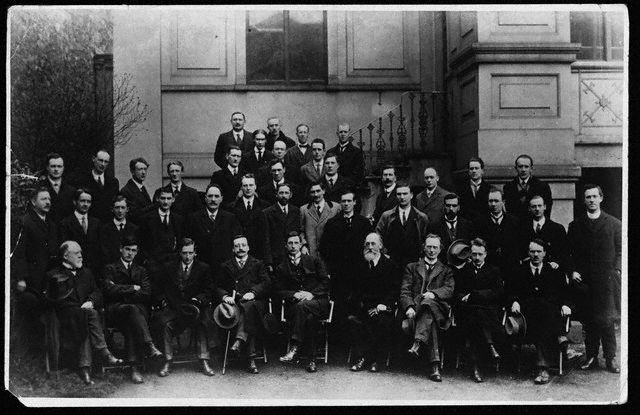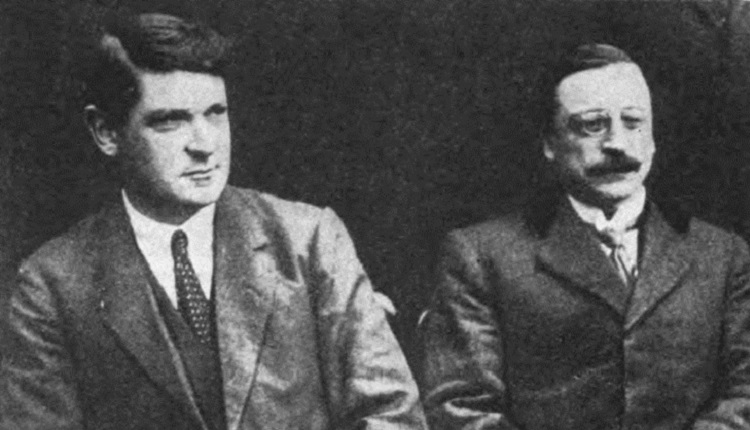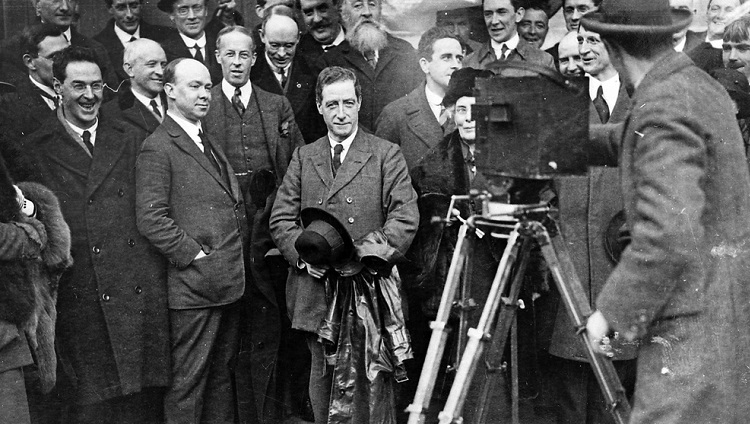Birth of a Democracy | Dáil Éireann at 100
100 years ago on the 21st of January, members of the first Dáil gathered in Dublin’s Mansion House to lay the foundations of Irish democracy. Not all members of the victorious Sinn Féin majority parliament were present for the historic occasion, many of them were in jails across Ireland and Britain, including Countess Constance Markievicz who was the first female TD and Eamonn De Valera the head of Dáil Éireann.
The 73 Sinn Féin members who were voted by the Irish electorate just a month previously in the General Election of December 1918 decided to set up a parliament in Ireland independent of Britain but, the democratic route to an independent Ireland soon turned violent when British tactics to suppress the will of the majority resulted in the War of Independence which lasted from 1919 until a truce in the Summer of 1921.
What followed would see a flawed negotiation for peace, the division of the island of Ireland between north and south and a bitter two year Civil War. Some of those who survived the bloodshed of the War of Independence would not survive the bitter violence of the Civil War, including those who were members of the historic first Dáil in 1919.

Arthur Griffith
Arthur Griffith was born in Dublin in 1871. He founded the United Irishman newspaper with William Rooney and later the Nationality newspaper. In 1897 he went to South Africa to recover from a bout of tuberculosis and while there he supported the Boer Rising against colonial rule. When Griffith returned to Dublin he founded Sinn Féin in 1905 as an economic nationalist movement which favoured home rule under a dual monarchy.
By 1916 the nationalism of Sinn Fein took on a form of republicanism and the movement Griffith founded had evolved into an Irish Republican party. In June 1918 he was elected for Sinn Féin in the East Cavan by-election and later that year he won for Sinn Fein in Tyrone North West.
Griffith spent most of the War of Independence in jail which no doubt affected his already fragile health. During the treaty negotiations he was head of the Irish delegation which signed the Anglo Irish treaty just before Christmas 1921. In early August 1922 Griffith went to St Vincent’s nursing home when his health went into decline. He continued to work in the newly established Free State government despite doctors advising him against it.
The strife of Civil War took it’s toll on Griffith and on the 11th of August 1922 as he was leaving to attend work at government buildings he collapsed and died.
Michael Collins
A week after Griffith was laid to rest, Michael Collins was shot dead in an ambush in County Cork. In 1918 he was elected for Sinn Féin in Cork South and Collins would go on to conduct the War of Independence through his network of spies and intelligence gathering. He went against his will but at the behest of De Valera to London for the treaty negotiations in 1921 and by 1922 he was head of a Free State army at war with former comrades in the IRA.
Collins remarked after the signing of the treaty that he had signed his death warrant, it was a remark which would prove fatally true.

Harry Boland
Harry Boland was born in 1887 in Phibsborough Dublin into a family steeped in the Republican tradition. He fought in the 1916 Easter Rising alongside his brothers and in 1918 he was elected as Sinn Féin TD in South Roscommon.
Boland was named as the Irish Republic envoy to the USA, where he went with De Valera on a successful fundraising tour after the establishment of Dáil Éireann in 1919. When the Civil War broke out, Boland sided with the Anti-Treaty Republicans and was shot in 1922 by Free State troops in the Skerries Grand Hotel. Boland was unarmed at the time and knew his killers but, as he lay dying at St. Vincent’s hospital he refused to identify them.
He died on August 2nd at the age of 35.
Sean Etchingham
Sean Etchingham was born in Courtown Wexford in 1868. Etchingham was a journalist with the Wexford Echo and was also an advocate of the Irish language and national freedom.
In 1916 he led a raid on a railway in Enniscorthy. Etchingham was arrested and sent to Dartmoor Jail but in the 1917 prisoner amnesty he was released. A year later Etchingham was elected for Sinn Féin in Wicklow East. His home in Wexford was burned by the Black and Tans in 1921 and when Civil War broke out he stuck with his Republican ideals and opposed the Treaty.
Etchingham was one of many Anti-Treaty Republicans languishing in prison during the Irish Civil War and he died behind bars at the age of 55 on the 13th of April 1923, his health and heart broken from the bitter conflict.
Joseph MacDonagh
Joseph MacDonagh, brother of 1916 martyr Thomas MacDonagh , was born in 1883 in Cloughjordan County Tipperary.
He was elected in 1918 for Sinn Féin in the constituency of Tipperary North but was in prison for the first meeting of the Dáil in 1919. He voted against the 1921 Anglo Irish Treaty and was jailed for his stance. In 1922 while imprisoned in Dublin, MacDonagh went on hunger strike and suffered a burst appendix.
After lingering in pain for days, MacDonagh died on Christmas Day.
Cathal Brugha
Cathal Brugha was born in Dublin in 1874 as Charles Burgess, he changed his name to it’s Irish version Cathal Brugha when he joined the Gaelic League in 1899.
In 1914 he led a contingent of Irish Volunteers to collect arms from the Asgard yacht in what would go down in history as the Howth gun running. In 1916 Brugha fought alongside Eamonn Ceannt in the South Dublin Union.
Brugha was severely injured when he was shot several times and as he lay in a pool of blood he was found by stunned British soldiers singing God Save Ireland at the top of his voice. Brugha miraculously survived with only a limp while Ceannt would face a firing squad in Kilmainham Jail.
In 1918 Brugha was elected Sinn Féin TD for Waterford and presided over the inaugural meeting of Dáil Éireann in January 1919.
During the Civil War he fought against the Free State forces on O’Connell Street. Brugha decided to shoot his way out of a surrounded building but, Free State troops cut him down and he died days later on July 7th 1922.

Liam Mellows
Another member of the first Dáil to die in the Irish Civil War was Liam Mellows. He was born in 1892 in Hartshead Military Barracks in Lancashire, the son of a British army officer.
In 1895 the Mellows family moved to Dublin and young Liam attended military college in Cork’s Wellington barracks but he refused the life of a British officer and opted instead to become a clerk. Mellows was interested in Irish culture and it was Tom Clarke, 1916 martyr, who first introduced Mellows into the Republican movement. He joined the Irish Republican Brotherhood and commanded the Western Division of the Irish Volunteers during the Easter Rising.
In the 1918 General Election Mellows was elected for Sinn Féin in North Meath and Galway East. In 1922 he sided with the Anti-Treaty Republicans and joined the IRA garrison at the Four Courts. Mellows was arrested when the Free State forces bombed the Four Courts and in Mountjoy Jail on the 8th of December he was executed by his former comrades.
Joe McGuinness
Joe McGuinness was born in 1875 in Roscommon and ran a drapery store in Dublin. McGuinness fought in the Four Courts during 1916 and a year later while locked up in Lewes prison he was selected to stand for Sinn Féin in the Longford South by-election.
From his prison cell McGuinness insisted he did not want to stand for election but Michael Collins ignored his pleas and set in motion an election victory for the reluctant candidate. In 1918 he was re-elected and became member of the first Dáil where he was named Director of Trade and Commerce.
In 1921 McGuinness voted in favour of the Anglo Irish Treaty and as the Civil War ramped up his health went into decline. McGuinness died at his home on May 3rd 1922, the tragedy of the Civil War had played it’s part in his poor health.
The members of the first Dáil who took their seats in what Britain deemed an illegal parliament did so at great risk to their own lives but, the greater risk came in the fight between comrades in the years that followed that historic day in 1919.
